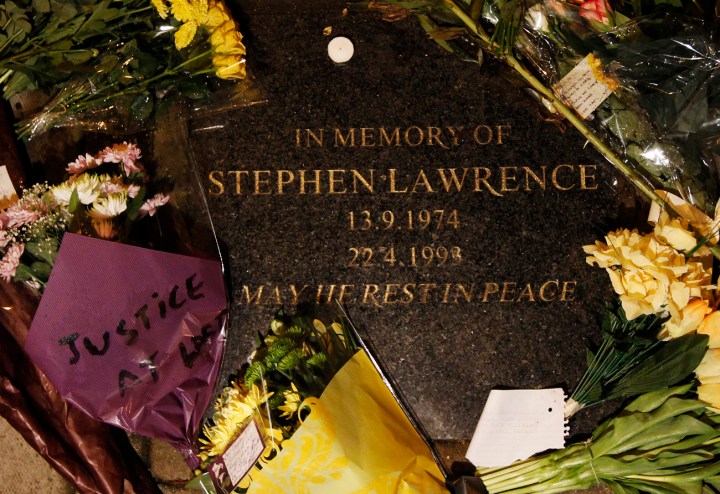Politics
Stephen Lawrence murder: The race case that’s still shaking Britain

The murder of Stephen Lawrence, the black teenager killed in a racial attack in the UK in 1993, has been said to have a greater impact than any other in modern British history. As of this week, two of his killers are finally behind bars. But many are unhappy with the leniency of the sentencing – and there’s even a politician in a racial Twitter controversy. Just like home. By REBECCA DAVIS.
Eighteen-year-old Stephen Lawrence was making his way home with his friend Duwayne Brooks on the evening of 22 April 1993. Seeking a quicker route, they got off their bus in Eltham, south-east London, and waited for the correct number bus to pass by. Lawrence walked a little down the road to see if he could spot a bus coming. While he was doing so, his friend noticed a group of five or six white youths approaching Lawrence. Before he was able to warn his friend, they descended on Lawrence and began stabbing him, allegedly while chanting racist slogans. Brooks began to run and shouted to Lawrence to do the same. Lawrence made it just over 100 metres before collapsing and bleeding to death.
That was 18 years ago. It has taken a time-span exactly equivalent to the entire duration of Stephen Lawrence’s life to bring his killers to justice – a long and torturous path that forced the reformation of the Metropolitan Police and a significant change to British law along the way. Despite repeated complaints from Lawrence’s family during the days and months after his murder that not enough was being done to investigate the case, it took a full three years for three juveniles – identified by Duwayne Brooks – to be brought to court. On 18 April 1996, the murder trial of Neil Acourt, Luke Knight and Gary Dobson began at the famous Old Bailey court in London. Just one week later, all three were freed on the grounds that Brooks’ identification evidence was inadmissible.
Lawrence’s parents were left to satisfy themselves with an inquest verdict in February 1997 that their son had been “unlawfully killed by five white youths”. The Lawrences responded by laying a formal complaint against the Metropolitan Police for their mishandling of the case, as well as alleged racist conduct by one of the officers who conducted the initial investigation. The full inquiry into their complaint took two years to complete, but it concluded, in 1999, that the police investigation into the murder was “marred by a combination of professional incompetence, institutional racism and a failure of leadership by senior officers”.
The diagnosis of institutional racism was particularly galling to the police, and it was the changes brought on by this charge that prompted the acting deputy commissioner of the Met, Cressida Dick, to say this year that the Lawrence case “had the greatest impact of any murder in modern British history on the police”.
But the Lawrences still wanted justice, and their tireless pressure on the police prompted a major reinvestigation of the case between 1993 and 2003. It proved fruitless: there was not enough evidence, police said, to prosecute anyone for Lawrence’s killing. In 2005, however, something important happened. As a result of the swirling doubts and ambiguities around the Lawrence case, the Law Commission recommended that the ancient principle of double jeopardy – which held that once an individual had been acquitted, they could never be charged with the same offence again – should be dropped. The recommendation came into force in April 2005.
In 2006 police finally decided to take a good, hard forensic look at some of original evidence in the trial. (There was, for instance, a bloodied jacket at their disposal to examine). Four years later, in September 2010, Gary Dobson (one of the three originally arrested and acquitted), 36, and David Norris, 35, were arrested. Thanks to the abolition of double jeopardy, the court of appeal was able to quash Dobson’s original acquittal for the murder so that he could be retried.
On 3 January 2012, Gary Dobson and David Norris were found guilty of the murder of Stephen Lawrence. Delivering the verdict, the judge noted that the murder had been committed “for no other reason than racial hatred”. A day later, they received their sentences: just 15 years for Dobson and 14 years for Norris. The reason for the short sentences is that the judge was obliged to follow the sentencing guidelines that would have applied to them had they been charged as juveniles (as they were at the time of the crime) in 1993. If the two had been sentenced under current guidelines, they would have received at least 25 years each.
Although Stephen Lawrence’s mother Doreen said she acknowledged that the judge’s hands were tied, the sentencing is now being examined by the attorney general after complaints about leniency from the public. Then, of course, there’s the fact that the other two or three individuals involved in Lawrence’s murder have not yet been brought to book. Detectives are hoping to visit the convicted pair in jail and attempt to extract more information about the murder from them, exploiting their presumed resentment about the fact that they will be languishing in jail while their fellow killers walk free. In other words, the case isn’t over yet.
Discussion of the trial and the sentencing has also prompted a more general national soul-searching about racism, and a political spat. Black Labour MP Diane Abbott, who is the shadow health minister, on Wednesday became embroiled in a Twitter discussion on the Stephen Lawrence case and its aftermath which landed her in hot water. A journalist called Bim Adewunmi used Twitter to comment that she took issue with the phrase “the black community” being used to generalise about the feelings of all black people. Abbott said in response: “I understand the cultural point you are making. But you are playing into a ‘divide and rule’ agenda”. She followed this up with: “White people love playing ‘divide & rule’. We should not play their game #TacticAsOldAsColonialism”. As her final comment, she added: “Ethnic communities that show more public solidarity & unity than black people do much better #DontWashDirtyLinenInPublic”.
The tweets were instantly picked up as political mileage by Conservative politicians, with more than one accusing Abbott of racism and calling for her resignation. Deputy Prime Minister Nick Clegg suggested her comments were “stupid and crass”, and Abbott was reportedly given a harsh dressing-down by Labour leader Ed Miliband, who apparently ordered her to apologise. On Thursday Abbott said: “I understand people have interpreted my comments as making generalisations about white people. I do not believe in doing that. I apologise for any offence caused.”
Inevitably, the Abbott incident has already caused countless further opinion pieces on whether the tweets were, in fact, racist. But what the episode shows is that the Stephen Lawrence case continues to cast a long shadow, and that race continues to be a divisive and difficult conversation in England. The degree to which the Met police can be said to have transformed was also left open to question last year in light of the circumstances which trigged the London riots: the police shooting of Mark Duggan, a black man who had not previously opened fire on the cops.
Perhaps one anecdote serves to illustrate better than others that the conditions which gave rise to Stephen’s murder still prevail to some degree in the UK. Stephen Lawrence had hoped to study to become an architect. On 7 February 2008 – a full 15 years after his death – his mother Doreen opened a £10-million architecture centre dedicated to his memory. It only took two weeks for the windows to be smashed – an attack motivated apparently solely by racial hatred. Much like the murder of the boy the centre was created to honour. DM
Read more:
- Stephen Lawrence murder: Norris and Dobson get 14 and 15 years, in the Guardian;
- Stephen Lawrence murder sentences to be reviewed by attorney general, in the Guardian;
- Diane Abott apologises over Twitter racism row, in the Guardian.
Photo: Reuters.






 Become an Insider
Become an Insider